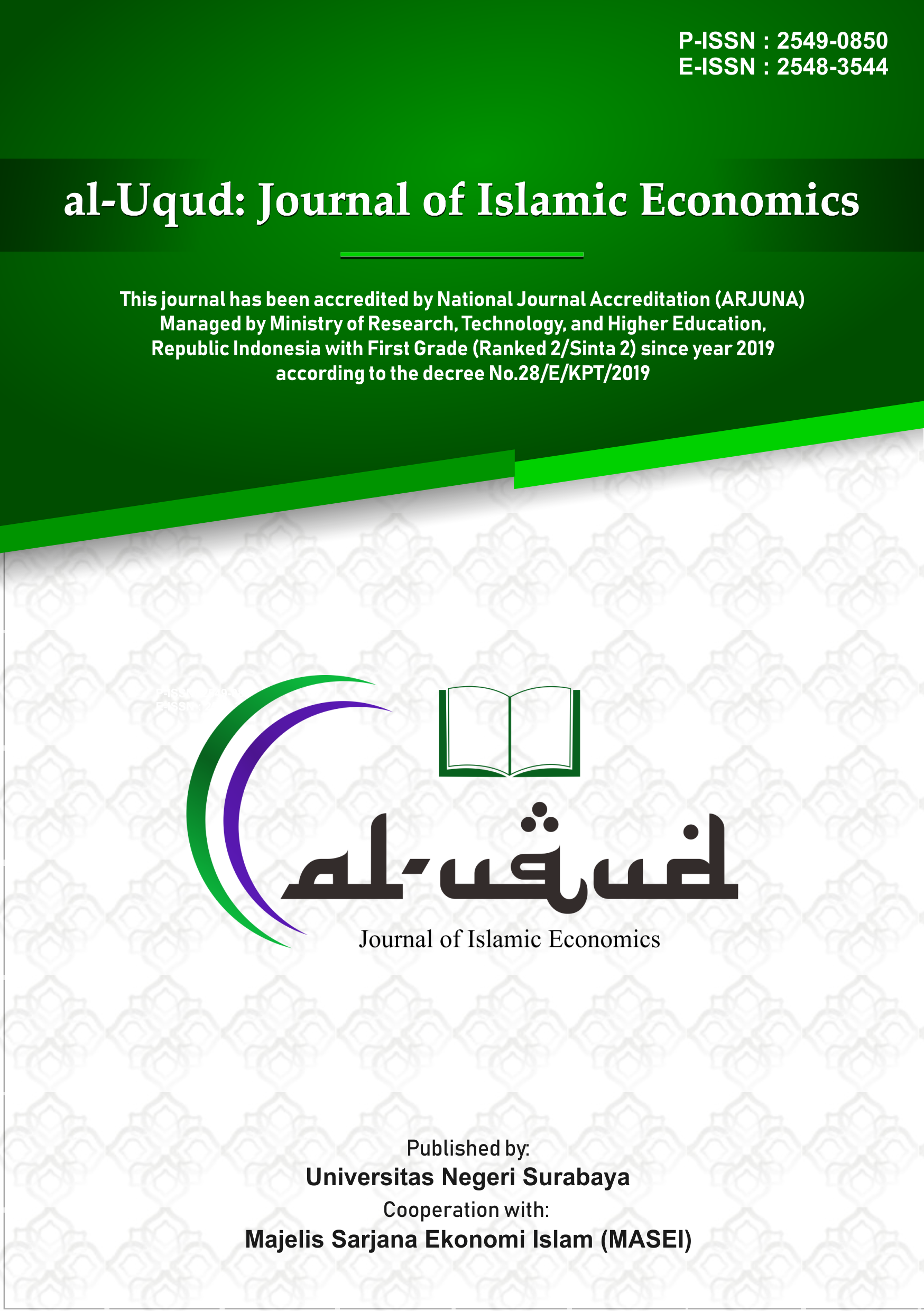PENGARUH KEPEMIMPINAN ISLAMI TERHADAP MOTIVASI, KINERJA, SERTA KESEJAHTERAAN ISLAMI
DOI:
https://doi.org/10.26740/al-uqud.v2n2.p121-140Keywords:
Islamic leadership, Work motivation, Employee performance, Employee welfare, Islamic hospitalAbstract
This study aims to examine and analyze the influence of Islamic Leadership on Work Motivation, Islamic Performance, and Welfare of Islamic Hospital Employees in Tulungagung Regency. The unit of analysis in this study is the employees of Islamic Hospital or Islamic nuanced hospitals in Tulungagung. While population in this research are employees of Islamic hospitals in Tulungagung District, and sampledby 133 people. Methods of research using quantitative structural equation models with AMOS software. The results can be summarized as follows: Islamic leadership influences employee motivation in Islamic hospitals. Islamic Leadership affects the performance of Islamic Hospital employees. Islamic leadership affects the welfare of employees in Islamic hospitals. Working motivation affects the performance of employees of Islam Hospital. But the motivation and performance did not effect significantly to the employee welfare at the Islamic hospital in Tulungagung.
References
Adiba, E. M. (2018). Kepemimpinan Islami, kepuasan kerja, komitmen kerja, dan loyalitas kerja di Bank Syariah Mandiri Sidoarjo. Al Uqud: Journal of Islamic Economics, 2(1), 6080.
Boshoff, C., Mels, G., & Nel, D. (1994). A restricted factor analysis model for the SERVQUAL instrument. In the 24th European Marketing Academy Conference. Paris.
Cahyono, B. (2010). Implementasi Pengelolaan Lingkungan Perusahaan dan Pengaruhnya Terhadap Kinerja Lingkungan dan Kinerja Perusahaan Serta Penyerapan Tenaga Kerja dan Kesejahteraan Karyawan Ditinjau dari Perspektif Islami Pada Perusahaan Konveksi di Jawa Tengah. Universitas Airlangga.
Detelin S, E., & Elenkov, D. S. (2002). Effects of leadership on organizational performance in Russian companies. Journal of Business Research, 55(6), 467480. https://doi.org/10.1016/S0148-2963(00)00174-0
Donna, M. S. (1996). Increasing Employee Productivity, Job Satisfaction and Organization Commitment. University of California at los Angeles.
Firdaus, A. (2018). Mengembangkan Siklus Penerapan Sistem Manajemen Kinerja Berbasis Kemaslahatan. Al Uqud: Journal of Islamic Economics, 2(1), 94120.
Ghoniyah, N. (2010). Pengaruh Tata Kelola Perusahaan dan Etika Kerja Islami Terhadap Kinerja Keuangan dan Kesejahteraan Karyawan pada Perusahaan Pakaian Jadi di Jawa Tengah. Universitas Airlangga.
Hakim, A. (2009). Implementasi Kepemimpinan dan Budaya Organisasi Serta Pengaruhnya Terhadap Motivasi Kerja dan Kinerja Islami Karyawan PT Bank Muamalat Indonesia Tbk. di Jawa Tengah. Universitas Airlangga.
Hamid, A. (2002). Pengaruh Budaya Organisasi Baru Terhadap Motivasi Kerja Dan Prestasi Kerja Di PTP Nusantara IV (Persero) Sumatera Utara. Universitas Airlangga.
Kaplan, R. ., & Norton, D. P. (1996). The Balanced Scorecard: Translating Strategy into Action. Boston: MS: Harvard Business School Press.
Khasbullah, M. N. (2018). Implementasi Kompensasi Dan Benefit : Tinjauan Manajemen Sdi Berbasis Syari'ah. Al Uqud: Journal of Islamic Economics, 2(1), 119.
Muafi. (2003). Pengaruh Motivasi Spiritual Karyawan terhadap Kinerja Religius: Studi Empiris di Kawasan Industri Rungkut Surabaya (SIER). Jurnal Siasat Bisnis, 1(8), 118.
Shaleh. (n.d.). Mausuah Al-Hadits asy-Syarif Kutubus Sittah, Shahih Muslim: Kitab Al-Aiman.
Shobari. (2010). Pengaruh preferensi gaya kepemimpinan dan iklim kerja terhadap kinerja pegawai pada instalasi gawat darurat rumah sakit badan layanan umum di Surakarta. Universitas Sebelas Maret Surakarta.
Solimun, Nurjanah, & Achmad, R. (2006). Pemodelan Persamaan Struktural Pendekatan PLS dan SEM. Malang: Unibraw.
Susilowati, I. (2003). Pengaruh Lingkungan Kerja terhadap Budaya Organisasi dan Kinerja Karyawan. Universitas Diponegoro.
Yousef. (2000). Hubungan Kepemimpinan, Budaya Organisasi, dan Kinerja Pegawai. Bandung: UniversitasPadjadjaran.
Zadjuli, S. I. (1999). Prinsip Prinsip Ekonomi Islam, Surabaya. Surabaya: Universitas Airlangga.
Downloads
Published
How to Cite
Issue
Section
License
CC BY 4.0 Abstract views: 1232
,
Abstract views: 1232
, PDF Downloads: 1422
PDF Downloads: 1422








